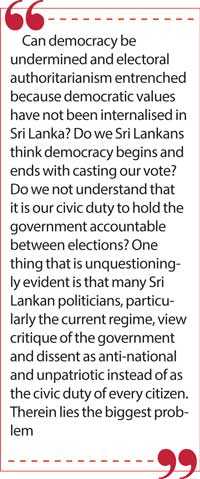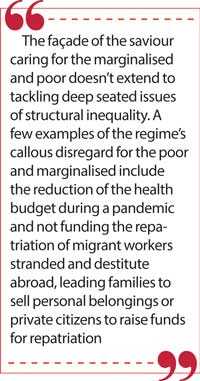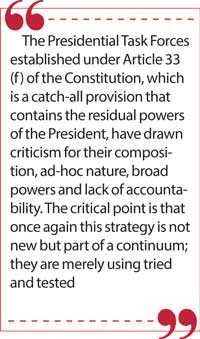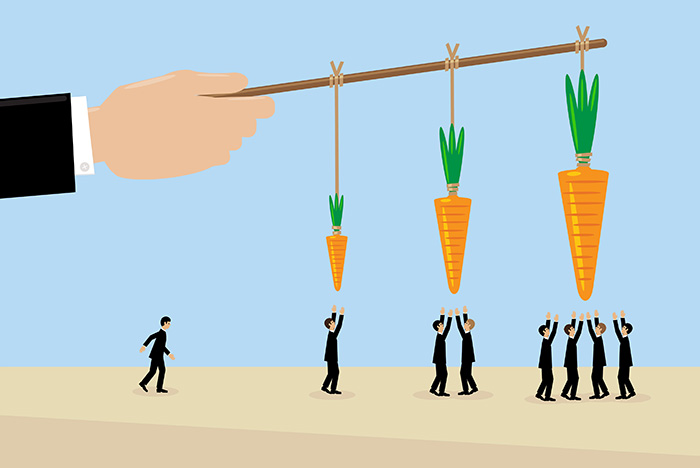Image courtesy of www.communicationtheory.org.
By Ambika Sathkunanathan.
The enactment of the twentieth amendment to the Constitution, militarisation and efforts to curtail civic rights have generated discussion on the state of democracy in Sri Lanka.
This discussion needs to pay heed to current processes, both visible and invisible, that are changing social value systems and public perception in ways that undermine democracy and respect for the rule of law. None of these processes, which have been successfully harnessed by the Rajapaksa regimes, are new, but part of a continuum spanning decades.
The pioneering work of two women, Alena Ledeneva, a Russian political scientist and Ece Temelkuran, a Turkish journalist, help understand the ways in which democracy is being eroded in Sri Lanka. In Sri Lanka, the social corruption, which Temelkuran says takes place during the evolution of a populist leader to an autocrat, consists of changing social belief systems, i.e. changing what is socially acceptable/legal/illegal etc.
When bigotry becomes socially acceptable
One of the key strategies identified by Temelkuran that autocrats-in-the-making use is to create a populist movement, which the Rajapaksas have done successfully through grassroots mobilisation and the cult of personality. One of the critical tasks of the movement has been to generate the belief that it is patriotic to openly express prejudice and bigotry, such as against Muslims, that previously may have been socially unacceptable, at least publicly. When people feel confident to express and act upon prejudice it leads to a change in their behaviour towards their colleagues, neighbours and even friends.
Many Muslims express shock and hurt that those they believed were their friends are not supportive of their struggle to bury those who die of COVID-19. When I listen to them I am reminded of similar remarks made to me by scores of Muslim women who were harassed by colleagues, neighbours and friends for wearing the Abaya after the Easter attacks in 2019, and before that, fears held by Muslims  due to the anti-Muslim rhetoric and acts that took place during the first Rajapaksa regime. This is hence part of a continuum. In such a context, those who express and act upon prejudice are celebrated as the ‘real people’ who love their country, while those that challenge bigotry and ethnocentrism are portrayed as traitors, unpatriotic and a danger to the country.
due to the anti-Muslim rhetoric and acts that took place during the first Rajapaksa regime. This is hence part of a continuum. In such a context, those who express and act upon prejudice are celebrated as the ‘real people’ who love their country, while those that challenge bigotry and ethnocentrism are portrayed as traitors, unpatriotic and a danger to the country.
The leader portrays himself as the ‘anti-politician’ and inspires public trust mainly because he is viewed as different and unconnected to the seedy world of politics. Gotabaya Rajapaksa has proclaimed that, ‘People want non-traditional politicians. People tend to select such nontraditional politicians’, and that ‘I am not a politician. I have never been a politician’, thereby portraying himself as the antithesis of a politician.
The politically disillusioned Sri Lankan public that has suffered inequality, discrimination and poverty for decades and feels alienated from politicians and civil society, that are viewed as privileged or cosmopolitan and not sensitive to the issues that affect the ‘real people’, not surprisingly gravitate towards the anti-politician.
The President astutely reminds the people that just as he saved the country from the LTTE he will now save the people from poverty, corruption, the underworld/drug lords and extremists. In Sri Lanka’s patronage driven culture with a feudal hangover, in which people expect the dispensation of favours in exchange for obeisance, he is hailed a hero who people believe will save them and the country from corrupt and unscrupulous politicians.
Why do people act against their self-interest?
The façade of the saviour caring for the marginalised and poor doesn’t extend to tackling deep seated issues of structural inequality. A few examples of the regime’s callous disregard for the poor and marginalised include the reduction of the health budget during a pandemic and not funding the repatriation of migrant workers stranded and destitute abroad, leading families to sell personal belongings or private citizens to raise funds for repatriation.
A recent egregious example is allowing visiting Ukrainian tourists to undertake excursions in breach of all health regulations, thereby forcing local tour guides to be placed in quarantine for two weeks resulting in the loss of income to them.
Communities that were adversely impacted by the inaction or negligence of the State, such as the aforementioned Yala Safari Drivers’ Association, stranded migrant workers, Free Trade Zone employees and low-income families that were quarantined for weeks without income and hence basic provisions, have been expressing surprise and disappointment at the treatment meted out to them, particularly because they say they had voted for this Government. What is surprising is that these  groups are surprised by the callousness of the regime given the regime’s track record when they were previously in power.
groups are surprised by the callousness of the regime given the regime’s track record when they were previously in power.
Why do people, while demanding an equitable society, paradoxically, gravitate towards saviours and paternal figures who perpetuate a culture dependent on maintaining the status quo? This non-rational core of the country and the cult of personality that supports the creation of a paternalistic state can be understood through a Sri Lankan analytical construct called the Ashokan Persona.
According to Michael Roberts, the Asokan Persona is ‘a cultural paradigm which encapsulates a relationship between a superior and a subordinate; and which describes a superior who is regarded as a righteous exemplary, one who is expected to function as a source of benevolent largesse, an apical fountainhead of status and pontifical authority and, in effect, as a central and pivotal force’.
Michael Roberts states that Buddhism was constructed into a legitimating force and invested the Sinhala kings with immense authority…they were also constitutive acts of world renewal, in which the king-elect was transformed into a god or re-renewed as a god. President Rajapaksa’s oath-taking ceremony held at Ruwanwelisaya, a Buddhist sacred site that was built by King Dutugemunu who according to legend defeated a Tamil prince to rule over the whole country, can be seen as an evocation of this notion.
In modern times, loyalty and obeisance to this saviour-leader is demonstrated through sycophantic action, such as statements praising the regime, constructing cut-outs of the president, prime minister and ministers, and posting obsequious messages on billboards with the names and photos of the president, prime minister, ministers and even minor politicians announcing that state initiatives using public funds were implemented under the guidance of these holders of public office.
Even Udayanga Weeratunga, a Rajapaksa relative reportedly responsible for bringing the Ukrainian tourists to Sri Lanka, issued a video statement that his venture was undertaken upon the Prime Minister’s advice, with the President’s approval and Basil Rajapaksa’s oversight. The State is thereby merged with the individual politician and the individual becomes the State. In this instance, the President or the Prime Minister becomes the centre around which the State revolves. This process was symbolically formalised when public officials took an oath on 1 January 2021 not only to serve the public but also to implement President Rajapaksa’s election manifesto ‘Vistas of Prosperity and Splendour’.
A strategy identified by Temelkuran that plays an integral role in making people vote against their self-interest, is ‘infantilising political language and destroying reason’. In a society still dependent on astrologers to decide election dates, logic has no place and ad hominem attacks are employed to counter and control criticism and dissent. People caught up in the hyper-nationalism that relies on communalism and fake news churned by media affiliated to the regime, pay no heed to truth, analysis or reason. As Temelkuran says, ‘eventually the armies of alternative truth became strong enough to change the political realities through lies and to build what felt like new countries out of nonsense’.
A perfect example of this, which Alena Ledeneva describes as the state and its affiliates no longer distinguishing “between analysis and propaganda”, is the statements and action of the state and its affiliates with regard to the struggle of the Muslim community to bury those who die of COVID-19. The attempt to disregard scientific evidence-based authorisation by the WHO, the Sri Lanka Medical Council and the College of Community Physicians of Sri Lanka, has led to contradictory and counter-factual statements by different ministers and members of parliament and farcical justifications by persons with no expertise to comment on the issue.
When formal systems don’t work, informality reigns supreme
Another process that undermines the rule of law is the creation of a new form of law and order, whereby while the law becomes the state weapon of choice to control social behaviour, particularly dissent, little respect is shown for the rule of law.
The President’s view of the rule of law is illustrated by his remarks to public officials in September 2020, when he instructed them to take his verbal instructions as circulars, and his February 2020 statement that ‘It is important that the Judiciary does not interfere needlessly in the functioning of the Executive and Legislative branches of the Government’.
On 7 January 2021, at an event at Temple Trees the Prime Minister stated that if public servants go beyond the law and regulations to serve the public in good faith the regime will protect them. When legal systems and processes become tools to be employed or dispensed with at the executive’s/regime’s convenience, the result is selective application of the law. For instance, while those who do not wear masks continue to be arrested, no action was taken against a television station supportive of the regime that is reported to have held a large Christmas party at which no health protocols were observed. When this happens, the public lose trust in the rule of law.
When formal rules and procedures do not function effectively or are applied unequally or in a biased manner, a parallel informal system of ‘getting things done’ which undermines institutions and legal processes, comes into being. This too is steeped in our culture and is nothing new, but has taken on new life, form and importance during the Rajapaksa regimes. Alena Ledeneva’s description of “sistema’ in Russia provides useful parallels to understand how it works.

Sistema ‘combines the idea that the state should enjoy unlimited access to all national resources, public or private, with a kind of permanent state of emergency in which every level of society—businesses, social and ethnic groups, powerful clans, and even criminal gangs—is drafted into solving what the Kremlin labels “urgent state problems.” Under Putin, sistema has become a method for making deals among businesses, powerful players, and the people. Business has not taken over the state, nor vice versa; the two have merged in a union of total and seamless corruption.’
She says that while “Russians are sincere in their denunciation of corrupt officials’ they also ‘defend and take pleasure in the paternalist comfort of sistema. They are proud of its manoeuvrability and flexibility: you can always find a way to get something done.” This sounds very similar to Sri Lanka where it is common to find a shortcut to get things done because the formal system does not work. Instead of fixing the system politicians step in personally to get things done, which further undermines the system and entrenches dysfunctionality.
An example is the President’s visits to villages as part of the ‘Discussion with the Village’ programme, the purpose of which is to “talk to the rural communities without intermediaries about their long-standing unresolved problems, solve them instantly to the extent possible and direct the rest which take time to deal with to the officials for solutions.”
At a meeting in Balangoda in December 2020, “Political leadership in the area was advised by the President to intervene to facilitate to prevent delays in transportation of tea leaves”. The transportation of tea leaves, for which tea growers need to find solutions with the assistance of State officials, instantly becomes an issue that is deemed to require political intervention. Yet, instead of being viewed as politicisation of administrative processes it is being used as an example of the President’s efficiency.
An outcome of the dominance of the informal system is the appointment of those known to and trusted by the regime to positions of power in the interests of ‘getting things done’, such as family members or friends. These persons also seem to be able to act in extra-legal ways with impunity.
For instance, based on a letter by head of the Sri Lanka Tourism Authority (SLTA), it appears that Udayanga Weeratunga, who is a relative of the President, has been able to bypass all health regulations and conduct tours without adhering to undertakings given to SLTA. The message is that one can escape legal action through patronage. In time, such action can have the effect of making institutions seem ‘superfluous,’ leading to people ask if they are needed, which provides the perfect justification to the Government to abolish them.
The Presidential Task Forces established under Article 33 (f) of the Constitution, which is a catch-all provision that contains the residual powers of the President, have drawn criticism for their composition, ad-hoc nature, broad powers and lack of accountability. The critical point is that once again this strategy is not new but part of a continuum; they are merely using tried and tested.
For example, one of the most powerful informal structures that superseded formal structures was the Presidential Task Force for the North (PTF) established in May 2009. The PTF had no Tamil member, but included the Secretary to the Ministry of Defence, the Chief of Defence Staff, Commanders of the Army, Navy and Air Force, and the Inspector General of Police.
Although it evolved, at the time, into a seemingly permanent structure that controlled and monitored the work of the non-governmental sector in the Northern Province until May 2014, its working methods and regulations were not public or transparent. At present an informal structure that attempted to usurp the power of a formal institution, i.e. the judiciary, is the Commission on Political Victimisation.
Ledeneva points out that when using informal networks ‘you think you are pursuing the targets of modernisation through the use of the tools which seem to you, as a leader, effective. But you cannot escape the long-term consequences’. The current regime uses, to borrow Ledeneva’s term, a ‘glitter ball of words’, such as ‘vistas of prosperity and splendour’, ‘innovation and development’ and ‘sustainable inclusive development’ to portray a modern outlook, while in practice entrenches patronage driven, informal methods that undermine public institutions, rule based systems and processes, and ultimately transparency and accountability.
Can democracy be undermined and electoral authoritarianism entrenched because democratic values have not been internalised in Sri Lanka? Do we Sri Lankans think democracy begins and ends with casting our vote? Do we not understand that it is our civic duty to hold the government accountable between elections? One thing that is unquestioningly evident is that many Sri Lankan politicians, particularly the current regime, view critique of the government and dissent as anti-national and unpatriotic instead of as the civic duty of every citizen. Therein lies the biggest problem.
The writer is a Fellow, Open Society Foundations. She was a Commissioner, Human Rights Commission of Sri Lanka from 2015-2020.
Courtesy of Daily FT/06.03.24
